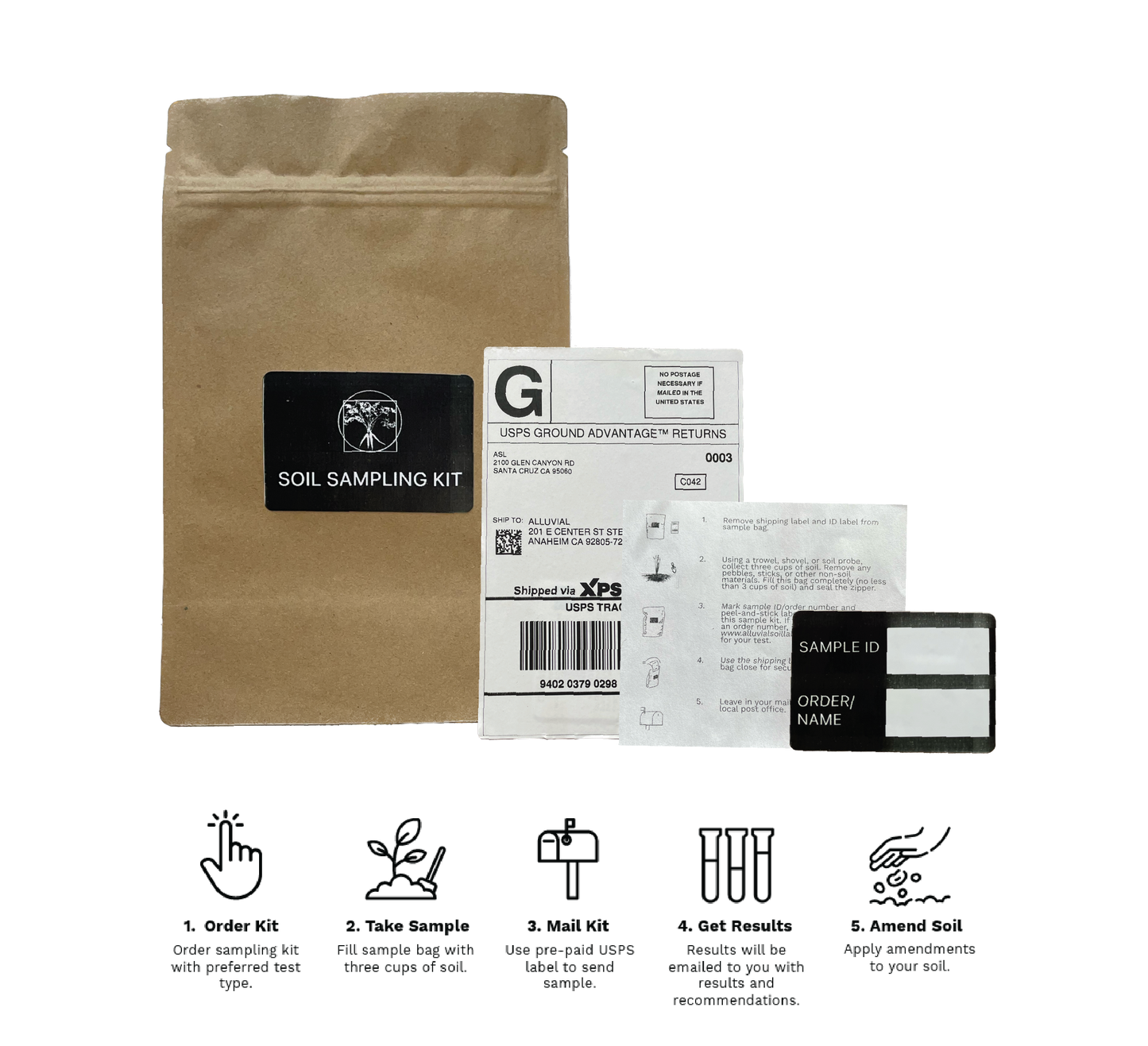Lawn/Turf Soil Management Report
Lawn/Turf Soil Management Report
High-traffic lawns are difficult to maintain because the constant foot traffic leads to soil compaction, reducing air and water infiltration to the roots. This compaction stresses the grass, making it more susceptible to diseases and pests. The wear and tear from frequent use cause physical damage to the grass blades, slowing down recovery and growth. Maintaining an even and healthy appearance requires more frequent mowing, aeration, and fertilization compared to low-traffic lawns. Additionally, high-traffic areas often experience bare patches and thinning, necessitating regular overseeding and repair efforts.
Couldn't load pickup availability
- Fast Turnaround Time
- Accurate Results
- Secure PCI/SSL Payment
- 30-Day Refunds
- Expert Recommendations
- Sustainable Packaging
Revitalize your lawn with our Lawn Soil Management Report Test Kit, designed for high-traffic lawn soil analysis to ensure healthy turf. MWELO and WELO compliant.
Report Includes
- Graphs, Data Analysis, and Personalized Recommendations: Detailed graphs and tailored advice for organic or conventional amendments to improve soil and turf health.
- 15-Minute Phone Consultation: Discuss results with a soil scientist from Alluvial Soil Lab to address compaction and optimize lawn care.
Microbial Activity
- CO2 Burst: Measures carbon dioxide release to assess microbial biomass and activity, vital for nutrient cycling and soil health.
- Amino-bound Nitrogen (SLAN): Evaluates nitrogen held by organic matter and amino acids, supporting plant nutrition.
- Active Carbon: Assesses carbon available to microbes, enhancing soil vitality.
Nutrient Analysis
- NPK and Secondary Nutrients: Tests nitrate, phosphorus, potassium, magnesium, and calcium levels, essential for turf health.
- Micronutrients (Zinc, Manganese, Iron, Copper, Boron): Evaluates micronutrient availability for plant physiological processes.
- Sulfur: Measures sulfur for amino acid and protein synthesis in grass.
- Organic Matter: Assesses organic matter to improve soil structure, water retention, and nutrient availability.
- pH and Buffer Index: Determines soil acidity and resistance to pH changes for optimal nutrient uptake.
- Cation Exchange Capacity (CEC) and Percent Saturation of Cations: Evaluates soil’s nutrient retention and exchange capacity.
- Soluble Salts, Sodium: Identifies salinity issues that may affect lawn health.
Physical Properties
- Infiltration Rate: Measures water penetration to address compaction in high-traffic areas.
- Texture: Analyzes sand, silt, and clay proportions, impacting water retention and drainage.
- Aggregate Stability %: Assesses soil structure stability for resilient turf.
Enhance your lawn with our Lawn Soil Management Report Test Kit. Get tailored recommendations to combat compaction and boost productivity. Contact us for expert lawn soil testing guidance.
Sampling instructions
Sampling instructions
Materials Needed
i. Clean plastic bucket
ii. Shovel or soil probe
iii. Plastic bag
iv. Labeling materials (marker, tape, or label)
v. Gloves & mask (for contaminated soils)
Sampling Process
Step 1: Define Sampling Area
i. Identify the specific area for testing.
ii. Collect one composite sample per 1,000 sq. ft.
Step 2: Collect Soil Samples
i. Use a clean bucket and shovel/probe to gather soil from three spots.
ii. Dig 6 inches deep, taking a vertical slice.
iii. Avoid compost piles, pet waste, or fertilized areas.
iv. Do not sample wet soil.
Step 3: Prepare Sample
i. Remove debris, break up clumps, and mix soil thoroughly.
Step 4: Package Sample
i. Measure 3 cups of mixed soil into a resealable plastic bag.
ii. Label with Sample ID, Test Type, and Order Number.
Step 5: Submit Sample
i. Purchase a test on our website.
ii. Mail to Alluvial Soil Lab, 201 E Center St, Ste 112-3083, Anaheim, CA 92805.
iii. Use any postal carrier.
For Soil Sample Kit Users
Step 1: Prepare Kit
i. Remove shipping label, ID tag, and instructions.
Step 2: Collect & Package Sample
i. Follow the standard collection process.
ii. Fill the provided bag completely.
iii. Attach the ID tag and secure the shipping label.
Turnaround and Results
i. Timing depends on test type.
ii. Results emailed with soil composition, nutrients, and recommendations.
Safety Precautions
i. Wear gloves/mask when handling potentially contaminated soil.
ii. Wash hands thoroughly after sampling.
Following these steps ensures accurate soil testing for better gardening decisions.
Advanced details
Advanced details
Test includes:
1. Organic Matter, Nitrate, Ammonium, Phosphorus, Potassium, Magnesium, Calcium, pH, Buffer Index, Cation Exchange Capacity, Percent Saturation of Cations, Sodium, Sulfur, Zinc, Manganese, Iron, Copper, Boron.
2. Texture
3. CO2 Burst (microbial activity)
4. SLAN (amino-forms of N)
5. Aggregate Stability (VAST)
4. Recommendations
*Since this test does not include infiltration rate, it is not WELO compliant
Suitability list includes list of (30) suitable species


Reviews
-

Jack Algiere | Stone Barns Center
Verified Purchase ✓
Alluvial Soil Lab provided us with comprehensive tests for our organic soil based greenhouse. The results were easy to read and will surely be a great tool for anyone looking to better understand their own soils.
-

Wilson H.
Verified Purchase ✓
I recently started a garden at a community plot, and wanted to know what was in my soil, so I could make more targeted amendments. Jake walked me through how to do so, and after sending my samples in... (read more)
-

Noah M.
Verified Purchase ✓
As a professional in the field I very much appreciate the timely and detailed report, along with skilled follow up communications. I will certainly use Alluvial Soil Lab's services again.
-

Zakary S.
Verified Purchase ✓
Great support and detailed report. Helped advise what options we had to plant trees! Plants are doing incredible! (read more)
-

Peggy C.
Verified Purchase ✓
I recently moved to a property with a vineyard, and wanted to know what type of fertilizers to use and how much to apply. So I did a soil test. I was new to soil testing and with Jake's help and instructions, I was able to successfully collect… (read more)
-

Adrian T.
Verified Purchase ✓
Alluvial makes complex scientific lab results accessible and legible for anyone.(read more)
-

Tom R.
Verified Purchase ✓
I wanted to start a vineyard on my land in Alpine, Ca. Unfortunately, it’s mostly clay. I contacted Alluvial and sent a soil sample...received a land rating with nutrient advice...the first test rows thrived, allowing me to plant more this Spring. Thank you! Couldn’t have done it without you. (read more)



